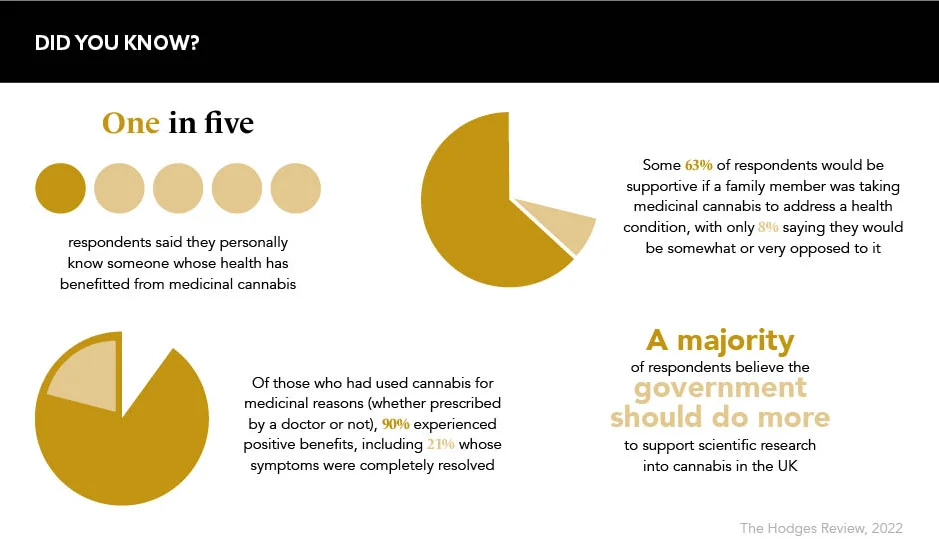How will the recommendations in The Hodges Review open up opportunities for the pharma industry and the UK medicinal cannabis market?
Words by Saša Jankovic
In its July 2021 ‘Life Sciences Vision’, the UK government set out its aim to make the nation “the world leader for development, testing, access and uptake of new and innovative treatments and technologies”. While many believe the use of cannabis in medicine should be at the top of any list of cutting-edge treatment research, the UK has been slower than others to advocate for medicinal cannabis use for conditions such as multiple sclerosis and epilepsy.
So-called ‘medical marijuana’ was legalised in California in 1996 to treat symptoms including chronic pain, and in 2013 Uruguay passed a law to establish a system of supply via pharmacies and social clubs, yet it took until 2018 for UK patients to access prescribed medicinal cannabis, and then only from specialist doctors.
But there is a rumbling of change. A recent policy review by Christopher Hodges, Emeritus Professor of Justice Systems, Centre for Socio-legal Studies, University of Oxford, calls for a new regulatory framework for the legal cannabinoid sector, which would set the UK on a path to become the global leader in cannabinoid innovation.
The Hodges Review explained
Published in June 2022, The Hodges Review – officially titled ‘From Containment to Nurturing: How the UK can become a world leader in cannabinoid innovation’ – was commissioned by the Centre for Medicinal Cannabis and the Association for the Cannabinoid Industry, with input from industry players, academics, patients, consumers and investors.
Despite the growth potential and start-up enthusiasm within this industry, the review states the legal cannabinoid market “has evolved by accident, without coordinated government action or a coherent strategy to steward it to maturity”. Furthermore, he says those working in the UK sector feel “restricted by current regulatory conditions and shut out of policy engagement with key decision makers on issues like patient access and education”.
The legal cannabinoid market has evolved by accident, without coordinated government action
In response, the 20 recommendations set out in the review include calls for GPs to be allowed to supply prescription cannabis, updates to hemp farming rules to permit licensed growers to extract the controlled parts of the cannabis plant on site under the right conditions, adjustments to the Proceeds of Crime Act 2002 to include exemptions for private enterprise entities operating in legal jurisdictions, and the creation of a national patient registry for all cannabis-based medicines prescribed in the UK. Prof Hodges also urges the UK government to establish a ‘stewarding’ authority to govern and guide the sector and implement the required reforms.
The review considers the cannabinoid sector through the lens of Outcome-Based Cooperative Regulation – a regulatory philosophy pioneered by Prof Hodges in which he argues that for regulations to be effective they need to be based in trust and collaboration. Prof Hodges believes that the regulatory framework he sets out for medicinal cannabis would achieve three important objectives.
The first would be offering global competitive advantage for the UK post-Brexit, helping the country leverage its historic and economic strengths in a rapidly growing and unprecedented global industry. The second would see the improvement of regulatory best practice to give early mover advantage, helping to pioneer new approaches to regulating a novel industry that other jurisdictions on a similar path can emulate. And finally, Prof Hodges champions a focus on scientific advances and innovations with pioneering new treatments, manufacturing methods and end user product innovations, helping the UK reinforce its reputation as the home of world-leading inventions and discoveries that improve the environment, health and quality of life.

Scope for innovation
With the recommendations in the Hodges Review focusing on creating appropriate governance, regulation and security around cannabis-based medicinal products, while also ensuring these products are of sufficient quality to provide health benefits to the patients who most need them, what could this mean for pharmaceutical companies looking to innovate in this exciting field?
Noting the currently “very limited” number of biotech and pharma companies involved in investigating cannabis-based medicines, Prof Claire Thompson, CEO, Agility Life Sciences – a UK-based formulation contract development and manufacturing company – says these recommendations “will surely bolster innovation in cannabis-based medicines and help get new medicines to patients”.
Similarly, Mike Morgan-Giles, CEO, Cannabis Industry Council (CIC), says the organisation “welcomes the Hodges Review recommendations, which increase the credibility and viability” of the UK cannabis sector, adding that thus far it has developed “without an overarching plan to maximise the health, environmental and economic benefits it can deliver”.
These recommendations will surely bolster innovation in cannabis-based medicines and help get new medicines to patients
To realise these benefits, “it’s vital that there are appropriate standards in place in areas such as product quality and assurance, alongside regulations which enable businesses to invest in R&D and create jobs”, Morgan-Giles says, adding that the CIC also backs the proposals “to enable GPs to prescribe medicinal cannabis to their patients, which is currently not allowed”.
Perhaps unsurprisingly, this is echoed by UK cannabis-based medicines manufacturer Celadon Pharmaceuticals. Its primary focus is on improving quality of life for chronic pain sufferers, but it is also exploring the potential of cannabis-based medicines for conditions such as autism, and, as such, welcomes the review’s focus on the “need for better data with the aim of supporting GP prescriptions”.
Furthermore, Morgan-Giles says the CIC is “supportive” of the review due to its clarifications around ‘novel’ classifications as “any product derived from synthetic cannabinoid synthesis is by definition novel”.
He explains: “Our view is that synthetic and isolated CBD products should remain novel under the EU Novel Food Regulations, but that hemp extracts produced using food safe techniques and designed for food supplement use should be exempt. If the UK were to diverge from the EU Novel Food Regulations in this way, it would reduce bureaucracy for small- and medium-sized enterprises, help grow the UK’s domestic market and enhance the UK’s position as a world leader in cannabis production.”
Clinical trials conundrum
Although one of the review’s recommendations is for the creation of a UK Centre of Excellence to advance the evidence base for cannabinoids and their applications, increasing clinical trials is another opportunity to drive growth in the UK medicinal cannabis sector and improve health outcomes for people across the nation – something that remains a conundrum for the pharma industry.
“Conducting high-quality clinical trials can provide the evidence needed to support patients benefitting from potential new treatments, such as the medical use of cannabis-based products,” says Dr Amit Aggarwal, Executive Director, Medical Affairs, Association of the British Pharmaceutical Industry. Yet, as Leslie Galloway, Chairman, Ethical Medicines Industry Group, explains, having the will to do so is not the same as having the means.
If stakeholders across the sector can collaborate to support and grow the industry, there will be benefits seen right across the board
“The NHS will not pay for a medicine that does not have sufficient evidence, so they turn to NICE to assess licensed pharmaceuticals and new active substances,” says Galloway. “My experience is that cannabinoid producers say they have accumulated data, but nowhere near the quality that would gain them a license, and they don’t want to invest in proper clinical studies because they are colossally expensive and can add 10-12 years to the launch timescale. The route to reimbursement in the UK is rigid: MHRA license, NICE health technology assessment, NHS prescription, and I don’t see the Hodges Review making an impact on that process.”
Ultimately, Morgan-Giles says it’s vital that no zero-sum game develops between pharma companies and those utilising more traditional methods of cultivation and production. “If stakeholders across the sector can collaborate to support and grow the industry, there will be benefits seen right across the board.”






